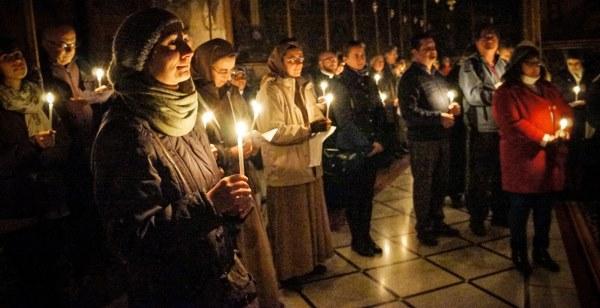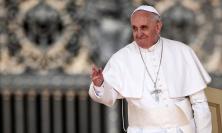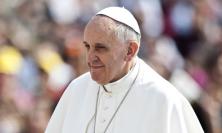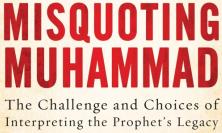Christians in the Middle East must be ‘a voice for justice, peace, pardon, reconciliation and selfless love’, writes David Neuhaus SJ from Jerusalem. The fear that dominates the experience of many Christian communities can only be overcome by understanding, dialogue and faith, he says, all of which are necessary to maintain the Christian presence in the Middle East.
In one of his pastoral letters to the Christian faithful in the Holy Land, Latin Patriarch of Jerusalem Michel Sabbah wrote:
Your first duty is to be equal to the situation. However complicated or difficult it is, you should try to understand it. Take all the facts into account. Consider them objectively, calmly but courageously, and resist any temptation to fear and despair.[i]
Fear
Any discussion of the situation of Christians in the Middle East today must begin with the reality of the fear that has gripped Christian communities as they watch the horrific scenes broadcast from Iraq and Syria. It is not insignificant that on 31 October 2010, a few days after the closure of the Extraordinary Synod on the Church in the Middle East, convened by Pope Benedict XVI in the Vatican, an attack on a Syrian Catholic church in Baghdad left 58 dead. The subsequent surge in acts of violence directed against various ethnic and religious minorities in different regions of the Middle East is one result of the toppling or destabilising of regimes that kept the Arab world in an iron grip for decades. In Egypt, Iraq and Syria, Christians watched in horror as the authentic and deep-rooted desires for human dignity, democracy and freedom that took shape in what became known as the ‘Arab Spring’, were transformed into a chaotic and mostly brutal struggle for power. Diverse extremists, freed from decades of forceful suppression by secular dictators, emerged from the underground into the light of day.
Since 2010, thousands of Christians have been driven out of their homes in Iraq and Syria. Christian roots and heritage have been wiped out by hooded terrorists speaking in the name of Islam and calling for the establishment of an Islamic Caliphate in the lands that have been home to Christians since the very beginning of the Christian faith. Hundreds of thousands of Christians have left behind their homelands not only in Iraq and Syria, but also in Egypt, Palestine, Israel and elsewhere, and emigrated to the West, to the New World, to more welcoming Arab countries like Jordan and Lebanon, in the wake of the collapse of a known political order.
Fear is linked to a term on the lips of many who observe what is happening: persecution of Christians. There is no doubt that some Christians have been killed because their Muslim extremist executors see them as infidels, polytheists or Western spies. However, as the Justice and Peace Commission of the Assembly of Catholic Ordinaries in the Holy Land pointed out:
In the name of truth, we must point out that Christians are not the only victims of this violence and savagery. Secular Muslims, all those defined as ‘heretic’, ‘schismatic’ or simply ‘non-conformist’ are being attacked and murdered in the prevailing chaos. In areas where Sunni extremists dominate, Shiites are being slaughtered. In areas where Shiite extremists dominate, Sunnis are being killed. Yes, the Christians are at times targeted precisely because they are Christians, having a different set of beliefs and unprotected. However they fall victim alongside many others who are suffering and dying in these times of death and destruction. They are driven from their homes alongside many others and together they become refugees, in total destitution.[ii]
It is also true that the term ‘persecution’, when it is used uniquely to describe Christian suffering in the contemporary Middle East, is often being manipulated within the context of a particular political agenda whose aim is to sow prejudice and hatred, setting Christians against Muslims.
Fear of what?
Fear is a bad teacher. In order to face fear and overcome it, it needs to be understood. Christians are a particularly vulnerable sector in the Arab world as for the most part they have consistently refused to organise themselves along denominational lines as political parties or militias. For decades (since the end of the nineteenth century), the Christians who were politically and socially motivated invested their energies in the development of Arab secular nationalism in various forms. In this project, they worked alongside similarly motivated Muslims and members of other minority communities. What came to be known as the ‘Arab awakening’ was successful as Arabs developed a sense of their identity, based upon the Arabic language, the Arab-Muslim civilisation and a vast geographical region that served as a centre for the ancient civilisations that gave the world Judaism, Christianity and Islam. In the wake of the 1948 War in Israel/Palestine, in many parts of the Arab world, the monarchic regimes were toppled by Arab nationalist revolutions. Subsequently, however, these nationalist regimes, often strongly supported by the army and the police, were transformed into dictatorships that used systems of control that brutally suffocated any opposition. Among the victims of these regimes were the members of movements that sought to strengthen Muslim identity and develop anti-Western, Islamic models of government.
The Holy Land Justice and Peace Commission document, formerly cited, stated:
Christians had lived in relative security under these dictatorial regimes. They feared that, if this strong authority disappeared, chaos and extremist groups would take over, seizing power and bringing about violence and persecution. Therefore some Christians tended to defend these regimes. Instead, loyalty to their faith and concern for the good of their country, should perhaps have led them to speak out much earlier, telling the truth and calling for necessary reforms, in view of more justice and respect of human rights, standing alongside both many courageous Christians and Muslims who did speak out.
It seems the worst Christian nightmares have become reality as the relatively secular dictatorial regimes were challenged by political Islam. The emergence of political Islam provokes a legitimate fear on the part of Christians who, at best, would be marginalised in a political system that insists on denominational identity and defines society in denominational vocabulary. At worst, Christians have been murdered, displaced from their homes, deprived of their rights, forced to submit to extortion and humiliation.
Fear does not know fine distinctions, however. It is essential that Christians study each current of political Islam in detail. The Islamic movements in Iraq and Syria are diverse and divided; these movements cannot be simply assimilated to the Islamic movements in Egypt and Palestine. Murder and programmatic displacement of Christians cannot be assimilated to demands that Islamic symbols be respected and prioritised; emptying Mosul and the plain of Nineveh of Christians is not the same as Muslims demanding that their daughters be allowed to wear a head covering (hijab) in Christian schools in Jerusalem. Fear must be overcome as Christians not only address directly the leaders of the diversity of currents of political Islam but also challenge them to reflect on the consequences of their ideologies and visions. In fact, some Islamic currents have begun to reflect on the challenge of denominational diversity and have begun a dialogue with Christians. Fear motivates a perception that all Muslims are partisans of one vision in which Christians have no place, but overcoming fear means seeing the diversity and complexity within the complex world of Islamic resurgence.
Overcoming fear and isolation
A first fruit of fear is the tendency to isolation. A visible tendency among Christians in the Middle East is to isolate themselves in their own neighbourhoods, institutions and clubs. After decades of refusing isolationist tendencies in politics, some Christians are now proposing that Christians need their own political parties. More extremist Christians are proposing a Christian identity that no longer includes the Arab component, its language and civilisation. According to this view, Christians are Arameans, Phoenicians, Copts or Chaldeans, but not Arabs.
Overcoming fear and its offspring, isolation, must take the Christians out of their self- imposed ghettoes in order to discover all those within the larger Arab world that are similarly threatened by monolithic Islamic visions that threaten the very composition of Middle Eastern society. First and foremost, it must be recognised that the first victims of Islamic extremism are Muslims who do not agree with the vision of the extremists. More Muslims than Christians have been murdered by the extremists; more Muslims have fled in fear. Secondly, other minorities, for example Yazidis, Druze and Alawis, are at greater risk than Christians because their religious faith and practice are seen as beyond any acceptable Muslim vision of diversity. Thirdly, the various currents within political Islam are far from united by a singular vision of relations with non-Muslims, and Christians must seek out those within these currents who are willing to engage and dialogue.
A national dialogue based upon shared visions of society and its future opens up communities to interact. The Holy Land Commission for Justice and Peace proposed in its recent document:
Christians and Muslims need to stand together against the new forces of extremism and destruction. All Christians and many Muslims are threatened by these forces that seek to create a society devoid of Christians and where only very few Muslims will be at home. All those who seek dignity, democracy, freedom and prosperity are under attack. We must stand together and speak out in truth and freedom (…) We, alone, can build a common future together. We have to adapt ourselves to our realities, even realities of death, and must learn together how to emerge from persecution and destruction into a new dignified life in our own countries.
Christians, in overcoming their fear, reawaken to a sense of solidarity with their compatriots in the broader Arab world. Whereas many are inviting them to abandon their homes and their identity in this time of crisis, church and civil leaders are inviting them to remain faithful to their homeland and national identity, and to be a leaven of hope amidst the tragic dramas of today.
Christian institutions and discourse
In the Exhortation of Pope Benedict XVI, ‘The Church in the Middle East,’ the Pope pointed to the preeminent role of the Christian institutions in the mission of the Christians in the Middle East.
For many years, the Catholic Church in the Middle East has carried out her mission through a network of educational, social and charitable institutions. She has taken to heart the words of Jesus: ‘As you did it to one of the least of these my brethren, you did it to me’ (Mt 25:40). The proclamation of the Gospel has been accompanied by works of charity, since it is of the very nature of Christian charity to respond to the immediate needs of all, whatever their religion and regardless of factions or ideologies, for the sole purpose of making present on earth God’s love for humanity.[iii]
Hundreds of Christian institutions are spread across the face of the Middle East: schools and universities; institutes for the frail, the elderly and the handicapped; hospitals; and other institutions that offer social and educational services. Almost all of them are characterised by their devoted service to the societies in which they were established and by their openness to all: Muslim and Christian, as well as other minorities. These institutions reveal the face of a Christian presence that seeks to serve not only Christians but society at large.
These institutions represent a very important Christian outreach beyond the hold of fear and isolation. Particularly notable are those institutions that serve almost entirely Muslim populations, showing the face of a Church that seeks to contribute to building up a society based upon conviviality and respect. In the Gaza Strip, 98% of the pupils in the Christian schools are Muslims. It is significant to note that after the Ba’athi revolutions in Iraq and in Syria, almost all the Christian institutions were nationalised, leading to the disappearance of this form of Christian presence in society. Perhaps the present catastrophe is related to this fact.
Christian institutions, particularly schools, universities and hospitals, are often places where Christians and Muslims not only rub shoulders but where relationships are established and discourse on diversity and respect is developed. It is through these institutions that the Christians can and do leave their mark on society.
The continued promotion of Christian institutions at the service of the entire population must go hand in hand with the development of an appropriate Christian discourse about the world in which Christians live. It is this discourse that must also distinguish the Christian as a voice for justice, peace, pardon, reconciliation and selfless love. Fear often provokes the development of a discourse that is reactive and insular, closing Christians off from their neighbours. The support and development of the Christian institutions which are at the service of all must be accompanied by the cultivation of a language spoken by Christians which opens them up to those with whom they share their daily lives. Faced with Muslim extremism, the Christian is called to discern, making distinctions between Muslim extremists and those Muslims who are friends, neighbours and compatriots, between extremism and those manipulated by the extremists. The Christian is also called to remember that Christians are no strangers to extremism, the toxic confusion of religion with political interests and the manipulation of God-talk in order to justify self-interest and greed.
The Christian presence in the Middle East is not and will not be measured by its statistical importance but rather by the significance of its contribution to society, particularly in its service of education, health and relief work and in its language of love.
Faith against fear
In the face of fears that Christians will continue to suffer as the Middle East continues to be shaken by instability and chaos, the only Christian antidote is faith. Christians are named for their Master who did not promise a bed of roses. Christ said to his followers: ‘If any want to become my followers, let them deny themselves and take up their cross and follow me. For those who want to save their life will lose it, and those who lose their life for my sake, and for the sake of the gospel, will save it’ (Mark 8:34-35). These are words that have guided generations of Christians who have laid down their lives in faithful witness to the Gospel. It is perfectly understandable that many balk at these words, preferring to guarantee a better future for their children in a world that seems more secure in Europe, the United States or Australia. A Middle Eastern Christian diaspora can even be a support for those who consciously choose to stay behind as well as those who simply have no possibility to leave.
However, those that inspire by their courage, determination and faith are the ones who, despite everything, stay in their ancestral homelands because they know that it is their vocation and mission to bear witness to Christ in the lands he knew best. These are the Christians whose sense of mission secures the future of the Church in the Middle East. They have put their hand to the plough and do not look back, nor do they flee. They do not fear nor do they accuse, they do not isolate themselves behind denominational walls, they do not remain paralysed in bitterness, but rather they look ahead, attempting to discern the way forward. Faith is the only sure way beyond fear and isolation to openness and service, seeking Christ and following him as he goes out in ever-widening circles. Faith is the deep-rooted sense that the victory has already been won in the resurrection, and that no matter what crosses are encountered on the way – extremism, hatred and rejection – the forces of death have been overcome in Christ’s Cross and life reigns supreme.
The renewal of faith in the Middle East among sorely tired Christians surely brings about a greater sense of Christian unity, overcoming the divisions of the past. Pope Francis has pointed repeatedly to the ‘ecumenism of blood’, as he did in his discourse in front of the Holy Sepulchre in Jerusalem, flanked by Greek Orthodox Patriarch of Constantinople Bartholomew.
When Christians of different confessions suffer together, side by side, and assist one another with fraternal charity, there is born an ecumenism of suffering, an ecumenism of blood, which proves particularly powerful not only for those situations in which it occurs, but also, by virtue of the communion of the saints, for the whole Church as well. Those who kill, persecute Christians out of hatred, do not ask if they are Orthodox or Catholics: they are Christians. The blood of Christians is the same.[iv]
This renewal of faith likewise brings a commitment to dialogue with Muslims (and Jews in the Israel-Palestine arena) in a frank and honest call to mutual respect and shared labour in building up a society free from oppression, ignorance and fear. It also strengthens the demand to be equal citizens, fully enfranchised and willing to bear the same obligations.
It is this voice of faith that is heard in the statement of the Holy Land Commission for Justice and Peace when they say:
We pray for all, for those who join their efforts to ours, and for those who are harming us now or even killing us. We pray that God may allow them to see the goodness He has put in the heart of each one. May God transform every human being from the depth of his or her heart, enabling them to love every human being as God does, He who is the Creator and Lover of all. Our only protection is in our Lord and like Him we offer our lives for those who persecute us as well as for those who, with us, stand in defense of love, truth and dignity.[v]
Fr David M. Neuhaus SJ serves as Latin Patriarchal Vicar within the Latin Patriarchate of Jerusalem. He is responsible for Hebrew-speaking Catholics in Israel as well as the Catholic migrant populations. He teaches Holy Scripture at the Latin Patriarchate Seminary and at the Salesian Theological Institute in Jerusalem and also lectures at Yad Ben Zvi.
This article has been published in Études and La Civiltà Cattolica.
[i] Latin Patriarch of Jerusalem, Michel Sabbah, ‘Pray for Peace in Jerusalem’ (1990), §51.
[ii] Communiqué of the Catholic Ordinaries in the Holy Land and Justice and Peace Committee, ‘Are Christians being persecuted in the Middle East?’ (2 April 2014).
[iii] Pope Benedict XVI, ‘The Church in the Middle East’, (2012), §89.
[iv] Address of Pope Francis, Church of the Holy Sepulchre in Jerusalem, 25 May 2014.
[v] ‘Are Christians being persecuted in the Middle East?’






